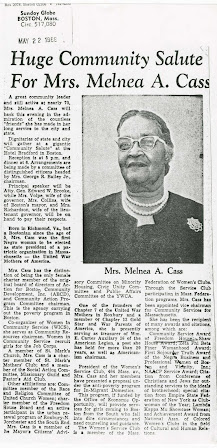Chances are if you have driven through the southern neighborhoods of Boston, you’ve found yourself at some point on Melnea Cass Boulevard. But just who is the woman that inspired the name of this street that runs from Roxbury to the South End?
Melnea Jones was born in Virginia in 1896. Her parents knew the importance of a quality education and so, when she was five years old, they moved their family up to Boston and settled in the South End. Unfortunately three years later her mother died, but under the care of her Aunt Ella, Melnea continued pursuing an education in both Boston and Newburyport. Recognizing her intellect, Aunt Ella saved enough money to send Melnea to the prestigious St. Frances de Sales Convent School in Rock Castle, Virginia, where she graduated as the valedictorian of her class in 1914.
Melnea returned to Boston after her graduation and, despite her educational achievements, was denied jobs because she was African-American. She worked as a domestic worker and experienced first hand the racial and economic inequalities that household employees faced, which inspired much of her efforts later in life. In 1917, she married Marshall Cass, an Army soldier who fought in World War I, and had their first child while he was deployed. When he returned from service, they had two more children. Despite her growing family, Melnea had the support to get involved in civil rights activism: her mother-in-law, Rosa Brown, was a powerful Boston activist in her own right and had founded the Women’s Service Club of Boston in 1919.
Melnea’s early activism involved helping African-American women register to vote and cast their first ballot following the passage of the 19th Amendment in 1920. But she didn’t stop there: greatly influenced by her mother-in-law and Boston-based civil rights activist and newspaper editor William Monroe Trotter, she became even more active, attending political lectures, protests, and civil rights meetings.
The Cass family moved to Roxbury in 1930, and there Melnea’s activism only increased. She was involved in a number of religious institutions, home front efforts during World War II, and organizations that assisted other African-American women, like the Robert Gould Shaw House, a settlement house named after the commander of the 54th Massachusetts Regiment, where she established a preschool nursey. She founded the Kindergarten Mothers, later known as the Friendship Club, to support local mothers and encourage early education. She also volunteered for the Harriet Tubman Mothers’ Club, the community activist Sojourner Truth Club, the Pansy Embroidery Club, and served as the secretary for the Northeastern Region of the National Association of Colored Women’s Clubs. She even served on the Massachusetts Advisory Committee for the Elderly in her later life.
She was also active in the NAACP early on, and served as the president of the Boston branch from 1962 to 1964. Under her leadership, the Boston branch organized sit-ins at the office of the Boston School Committee to protest inequality in the curriculum and racial imbalances in Boston public schools.
Melnea was also involved in the Women’s Service Club of Boston (WSC), an organization that began as a knitting club for African-American women that quickly grew to be a philanthropic community hub under the leadership of her mother-in-law, Rosa Brown. The WSC not only organized food drives, but also offered educational classes, job placement services, and affordable shelter to female students, workers, and migrants who were unable to find housing due to racist policies. Melnea became president of the club in 1962 and served until 1978, creating their Homemakers Training Program and Immigrant Program. The WSC championed women from the Caribbean and the South who arrived in Boston and worked as domestic staff. At the time, household workers did not have the same protections that other workers did such as a minimum wage or a maximum amount of hours they could work in a day. Under Melnea’s leadership, the WSC worked with the National Committee on Household Employment and Action for Boston Community Development (ABCD), of which Melnea was a charter member, to improve these protective measures, while offering social services, professional training, and legal education at the club headquarters at 464 Massachusetts Avenue. Their efforts were recognized when the Massachusetts Legislature passed Chapter 760 of the Acts and Resolves of 1970, An Act Making Domestic Employees Subject To The Labor Laws. The Women’s Service Club continues their work in the South End of Boston today and celebrated their 100th anniversary in 2019.
The Women’s Service Club is not the only lasting part of Melnea Cass’ work. In 1949, she founded the Freedom House alongside social workers and married couple Otto P. Snowden and Muriel S. Snowden, which continues today in its mission to promote economic self-sufficiency and social justice at its location at Grove Hall. Melnea Cass was also the only female charter member of the aforementioned Action for Boston Community Development, incorporated in 1962, which continues to administer poverty-relief programs in the Greater Boston area.
It is not surprising that, based on this gargantuan legacy, Melnea Cass has been the recipient of numerous honors and awards, specifically honorary degrees from Boston College, Northeastern University, and Simmons College. May 22, 1966 was proclaimed “Melnea Cass Day” by Mayor John Collins and several Boston-area facilities bear her name, including Melnea A. Cass MDC Swimming Pool and Skating Rink in Roxbury, the Melnea A. Cass Clarendon Street Branch of the YWCA, and of course, Melnea Cass Boulevard. Melnea Cass passed away in 1978, but she is still known today as the First Lady of Roxbury.
"If we cannot do great things, we can do small things in a great way.” – Melnea Cass
Further Reading:
Alexandra Bernson
Reference Team










